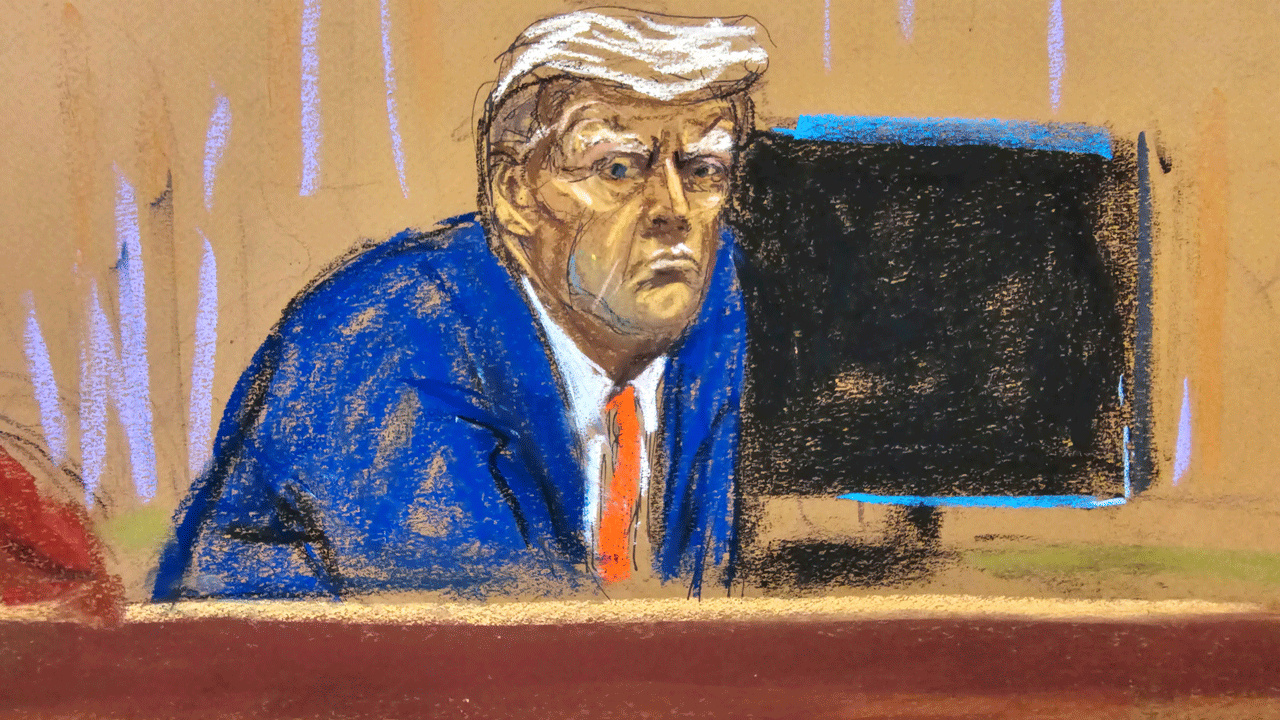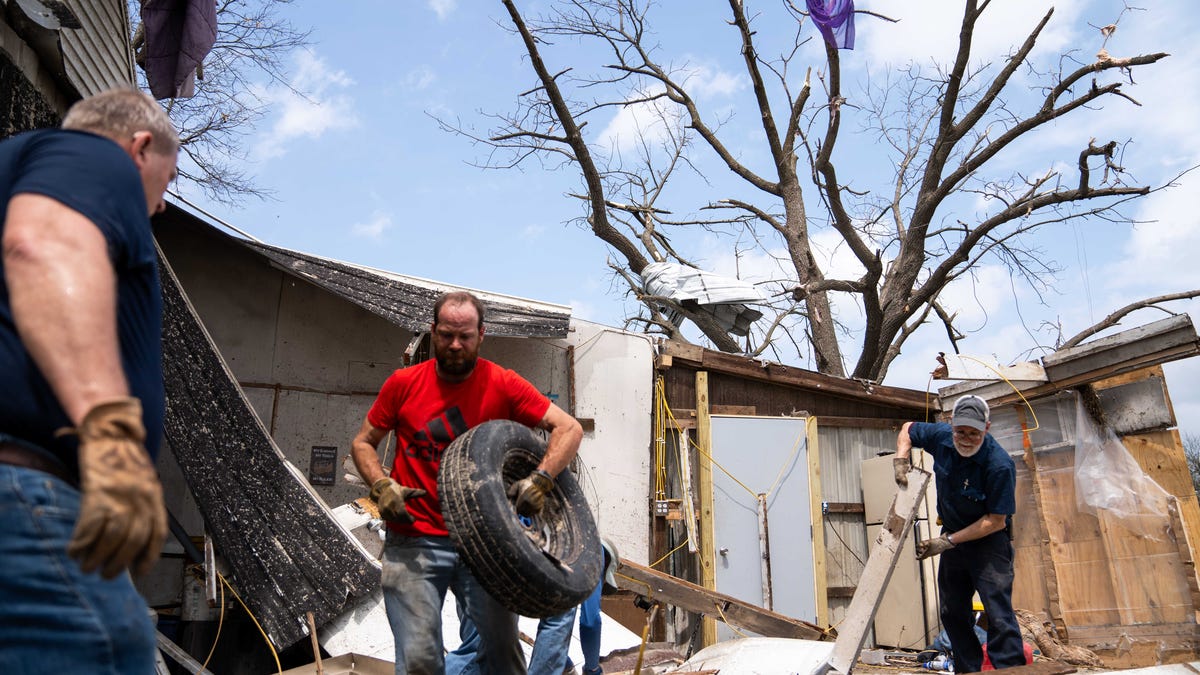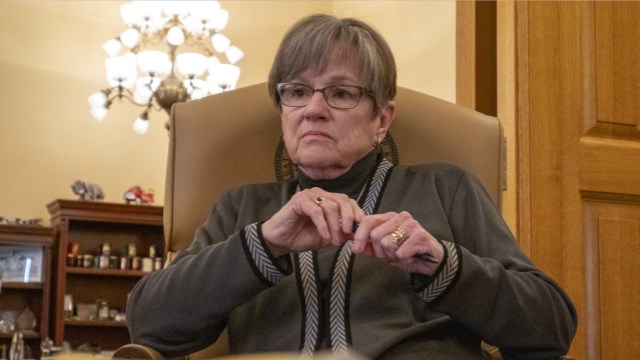Northeast
Trump trial: Why can't Americans see or hear what is going on inside the courtroom?

- Former President Donald Trump is the first U.S. president to face criminal charges in an American courtroom, but most of the country is getting news of the trial secondhand.
- New York law regarding media coverage in court proceedings is one of ‘the most restrictive’ in the nation.
- A limited number of cameras and reporters are positioned in a hallway outside the courtroom to capture remarks of those in the trial who want to address the outside world.
NEW YORK (AP) — It’s a moment in history — the first U.S. president facing criminal charges in an American courtroom. Yet only a handful of observers are able to see or even hear what is going on.
Instead, most of the nation is getting news of former President Donald Trump’s hush money trial secondhand. Starting with preliminary motions and jury selection Monday, reporters in a Manhattan courtroom must convey what is being said to the outside world after the fact.
TRUMP TRIAL: JURY SELECTION TO RESUME AFTER POSSIBLE JURORS EXCUSED FOR SAYING THEY COULD NOT BE IMPARTIAL
That’s all because New York state law regarding media coverage of court proceedings is one of the most restrictive in the country. Last week’s death of O.J. Simpson, whose murder trial beamed live from a California courtroom captivated a nation three decades ago, was a telling reminder of how New York is behind the times — or, at least, a holdout.
WHY WON’T NEW YORK LET ME SEE IT?
Regulations limiting media coverage in courtrooms date back nearly a century, when the spectacle of bright flashbulbs and camera operators standing on witness tables during the 1935 trial of the man accused of kidnapping and killing Charles Lindbergh’s baby son horrified the legal community, according to a 2022 report by the New York-based Fund for Modern Courts.
Rules to enforce decorum spread nationally, amended to account for the invention of television, as defense lawyers worried that video coverage would harm their cases, the report said.
Yet an interest in open government chipped away at these laws and — slowly, carefully — video cameras began to be permitted in courts across the country, often at the discretion of judges presiding in individual cases.
New York allowed them, too, on an experimental basis between 1987 and 1997, but they were shut down. Lobbyists for defense lawyers remain strong in New York and hold particular sway among lawyers in the state Assembly, said Victor Kovner, a former New York City corporation counsel who advocates for open courtrooms.
New York and Louisiana are the only states remaining that completely restrict video coverage, the Fund for Modern Courts said.
In this courtroom sketch, former President Donald Trump turns to face the audience at the beginning of his trial over charges that he falsified business records to conceal money paid to silence porn star Stormy Daniels in 2016, in Manhattan state court in New York, Monday, April 15, 2024. (Jane Rosenberg/Pool Photo via AP)
To Kovner and others, that’s outrageous.
“We’re the media capital of the world, we like to think, and the fact that cameras aren’t permitted in one of our three branches of government is unacceptable,” said New York State Sen. Brad Hoylman-Sigal, who has sponsored a bill to try to change that.
“It’s one of the most consequential trials of our modern age,” the senator said. “I think the public has a right to see exactly what happens in that courtroom.”
On the trial’s first day, some reporters suggested that it appeared there were times that Trump drifted off to sleep while watching the proceedings. The former president’s campaign disputed that. With no video camera in place and trained on him, there’s no way of knowing for sure.
WAIT — I SAW A PICTURE OF TRUMP IN COURT AT THE TRIAL’S START
That’s because the presiding judge, Juan M. Merchan, permitted a handful of still photographers to shoot photos of Trump before the day’s proceedings started. Once court was called into session, courtroom sketch artists — a dying communications form — hold sway.
There is actually some video coverage of the trial, available on monitors in an overflow room adjacent to the main courtroom. It was packed Monday with reporters, court officers and a few members of the public, including Ron Sinibaldi, a former accountant from Long Island who lined up outside the courthouse before midnight for a seat.
“I read presidential biographies,” Sinibaldi said. “I go to presidential libraries. I’m here for the history.”
HOW CAN THOSE INVOLVED GET AROUND THE RESTRICTIONS?
In a hallway outside of the courtroom, a limited number of cameras and a small pool of reporters are positioned to capture remarks of anyone involved in the trial who want to address the outside world. That included Trump, even before the proceedings started.
Absent live coverage of the trial, how often the former president chooses to take advantage of those cameras and whether news organizations carry his remarks either live, taped or not at all will play a big role in how the case is perceived publicly.
MSNBC carried his remarks live on Monday morning. “They’re trying to grab the narrative regardless of the outcome,” CNN reporter Phil Mattingly said of the Trump defense team.
HOW ARE JOURNALISTS COVERING THE TRIAL HANDLING IT?
With some difficulty. CNN stationed a team on the streets of Manhattan outside the courtroom, where a truck festooned with pro-Trump flags frequently drove by, blaring horns and music from loudspeakers. Reporters sometimes struggled to be heard. “It is kind of a circus down here,” CNN’s Kaitlan Collins said.
Commentators and experts, many of them with experience in jury selection, offered opinions from outside the courtroom or from studios. Fox News analyst Jonathan Turley said “most cities, at least those outside of New York,” will see the case as a weaponization of criminal justice.
With estimates that jury selection could take two weeks, and no way of showing it, journalists will have a lot of time to fill unless they turn their attention elsewhere.
WILL OTHER TRUMP CASES BE TELEVISED?
Georgia, where Trump faces charges of election meddling, gives judges discretion over whether to allow television cameras. Superior Court of Fulton County Judge Scott McAfee has said he will make all hearings and trials in that case available for broadcast. That has already included hearings on whether Fulton County District Attorney Fani Willis would be allowed to argue the case.
Federal courts do not allow cameras in criminal cases. Trump is facing separate federal cases for election interference and mishandling classified documents, although it is not clear when, or if, trials will take place.
The feds offer one glimmer of hope: The U.S. Supreme Court permits audio of oral arguments to be broadcast outside of the courtroom. But there’s no indication that this would apply to Trump’s case. New York’s law does not allow audio coverage of his hush money trial.
Proponents of legislation to open up New York courts to electronic media coverage are hoping the attention paid to the Trump case may boost their proposals. The idea is being considered as part of current negotiations over the New York state budget so, theoretically, a new law could even affect the Trump trial if it is passed and goes into effect immediately.
Given New York state’s history, it’s best not to count on it.
Read the full article from Here

Maine
Sea off New England Had One of Its Hottest Years in 2023, Part of a Worldwide Trend

Massachusetts
Massachusetts Board of Elementary and Secondary Education meeting at Wellesley High on April 30 – The Swellesley Report

Members of the Board of Elementary and Secondary Education will meet at 9:30 a.m. on Tuesday, April 30 at Wellesley High School. The public is welcome to attend, though the meeting will also be streamed online.
Wellesley High gets the honor of hosting the meeting because the Board’s student rep, Ela Gardiner, is a Wellesley High student. According to Gardiner’s bio on the Board website, “Ela has been a trailblazer for young voices in Massachusetts advocacy, working with the Massachusetts Association of Student Representatives and the National Student Board Member Association.”
Meeting agenda:
Statements from the Public
Comments from the Chair
Comments from the Secretary
Comments from the Acting Commissioner
- Receiverships (Lawrence, Southbridge, Holyoke)
- Felix Commonwealth Virtual School
- Brockton
- FAFSA
- Perkins State Plan
Routine Business:
Approval of the Minutes of the March 26, 2024 Regular Meeting
Agenda Items:
- Welcome from Wellesley Public Schools
- Update on Commissioner Search — Discussion
- Update on the Safe Schools Program for LGBTQ Students (download) — Discussion
- Update on DESE’s Educational Vision
- Literacy Launch (download) — Discussion
- Early College (download) — Discussion
- Education Budget Update: House Ways and Means FY25 State Education Budget Recommendations (download) — Discussion
Other Items for Information:
- Report on Grants Approved by the Commissioner (download)
Please support your local news source
New Hampshire
The fraught path forward for cannabis legalization – NH Business Review

New Hampshire’s cannabis legalization effort has reached a tricky crossroads.
A year after Gov. Chris Sununu announced he would support a legalization approach that meets a number of strict conditions, the New Hampshire House has passed a bill. That bill, which cleared the House 239-136 last week, is now in the hands of the Senate.
But the governor has already raised issues with the bill, arguing that it does not follow his vision of establishing retail cannabis outlets that are state controlled.
Now, House Bill 1633 is in front of the Senate Judiciary Committee, and senators, House members, cannabis advocates, and representatives of the governor’s office are working to find a compromise that might please all sides, and not fall afoul of federal laws.
Here’s the latest on the state of cannabis legalization.
Sununu’s position
After years of wavering between skepticism and outright opposition to cannabis legalization in New Hampshire, Sununu surprised many in May 2023 when he released a statement saying he would sign a legalization bill if it met certain criteria.
In order to win Sununu’s support, the bill would need to include a retail model that allowed legal sales only at specific outlets overseen by the state, the governor stated. That approach would include measures to keep cannabis outlets away from schools; prohibit “marijuana miles,” or areas where cannabis stores are concentrated; allow towns to decide whether to permit a cannabis outlet; and provide state control over marketing, messaging, distribution, and access.
Some legalization advocates have opposed that approach, seeing it as unnecessary interference with the free market that would keep costs high.
What has the House done?
The House has passed a number of versions of the cannabis legalization bill this term, as lawmakers quarrel over how closely to adhere to Sununu’s vision.
The legislation that left the House last week, HB 1633, would allow the state to license up to 15 retail establishments. The 43-page bill would legalize the use and purchase of cannabis for anyone 21 or older, and create a commission to license and regulate retail outlets.
Sununu’s issue arises from how those outlets would be managed by the state. The House has adopted a licensing model. The governor prefers a franchise model, which would allow the state to dictate the marketing, layout, and appearance of the cannabis outlets, similar to how fast-food companies allow people to open franchises but require that stores follow brand guidelines.
“The state would essentially be an operational partner, like McDonald’s to a McDonald’s franchise,” said Karen O’Keefe, director of state policies for the Marijuana Policy Project, an advocacy organization.
To Sununu, the retail license model doesn’t give the state sufficient control over sales.
“Governor Sununu has been crystal clear about the framework needed for a legalization bill to earn his support, focusing on harm reduction and keeping it out of kids’ hands,” the governor’s office said in a statement last week. “The legislation passed today doesn’t get us there but the Governor looks forward to working with the Senate to see if we can get it done.”
Why did the House deviate from Sununu’s position?
To some House lawmakers and cannabis legalization advocates, the question of whether to adopt a franchise or license model is not academic: It could have real legal implications for the state.
“Here we are in the world of cannabis, where everything is changing federally under our feet as we try to legalize it here in New Hampshire,” said Tim Egan, an advocate representing the New Hampshire Cannabis Association.
The U.S. Federal Trade Commission has regulatory power over franchised businesses, and requires a certain level of disclosure by companies that are selling franchise rights to others in order to prevent unfair practices.
While 24 states have legalized cannabis, New Hampshire’s state-run retail system would be a first in the U.S. That lack of precedent has made some legalization supporters concerned that a franchise model could allow the FTC to step in and shut down the state-run stores, given that cannabis is still illegal under federal law. Concerns over state liability have pushed some to argue that the licensee model is better.
“Early on, people that knew something about franchise law said, ‘Just don’t do this; you can’t do this,’” said John Reagan, a former Republican state senator from Deerfield who now lobbies in favor of legalization. “You’ll be in a paralyzed situation, and won’t be able to get anything done.”
Others have raised concerns about how close the franchise model could put the state to the cannabis sales themselves. That could raise the possibility for lawsuits, O’Keefe said. The state could potentially face a lawsuit under the Racketeer Influenced and Corrupt Organizations Act (RICO), under the premise that it is engaged in sales of an illegal drug. Or it could face litigation over the “impossibility pre-emption,” the doctrine that prevents an employee from needing to follow both a state law and a federal law if the two conflict.
Meanwhile, many states that have legalized have already faced difficulty navigating how to collect revenue from retail sales without falling afoul of banking regulations. New Hampshire’s franchise model could invite similar headaches, Egan said.
What’s next for the bill?
HB 1633 has arrived at the Senate Judiciary Committee, which is holding a hearing on April 25. But even before the committee takes it up publicly, stakeholders and senators are already meeting to attempt to finesse the bill to Sununu’s liking.
To be successful, senators will need to thread a needle: Tweak the House bill just enough to win the governor over, but not so much that it transforms the state model and loses support in the House. If the Senate passes a bill that the House does not immediately accept, it could go to a committee of conference, which advocates worry could doom its chances.
Amid those stakes, a potential compromise to the bill has emerged, Egan and O’Keefe say. The proposal would create the franchise model the governor asked for, but include a trigger clause that would implement the licensee approach should the franchise approach be struck down in court. That could allow the state to carry on retail sales even if the federal government intervened.
“I think that would be a great way to bridge the gap,” O’Keefe said. “If (the governor) thinks the franchise model is going to work, then if it works, it works. But if it doesn’t work, then you can address the House’s concerns there.”
For now, discussions are ongoing with Sens. Daryl Abbas, Becky Whitley, Cindy Rosenwald, Tim Lang, and Rep. Erica Layon, according to Egan.
Legalization supporters have attempted a variety of legislative models over the past decade, only to see them struck down by the Senate. But for advocates, with Sununu declining to run for reelection, legalization could be now or never.
“If the goal is to get it done, this is the window,” said O’Keefe. “There is no guarantee that next year there will be a governor that will sign any bill.”
This story was originally produced by the New Hampshire Bulletin, an independent local newsroom that allows NH Business Review and other outlets to republish its reporting.
-

 Kentucky1 week ago
Kentucky1 week agoKentucky first lady visits Fort Knox schools in honor of Month of the Military Child
-

 News1 week ago
News1 week agoIs this fictitious civil war closer to reality than we think? : Consider This from NPR
-

 World1 week ago
World1 week agoShipping firms plead for UN help amid escalating Middle East conflict
-

 Politics1 week ago
Politics1 week agoICE chief says this foreign adversary isn’t taking back its illegal immigrants
-

 Politics1 week ago
Politics1 week ago'Nothing more backwards' than US funding Ukraine border security but not our own, conservatives say
-

 News1 week ago
News1 week agoThe San Francisco Zoo will receive a pair of pandas from China
-

 World1 week ago
World1 week agoTwo Mexican mayoral contenders found dead on same day
-

 Politics1 week ago
Politics1 week agoRepublican aims to break decades long Senate election losing streak in this blue state















